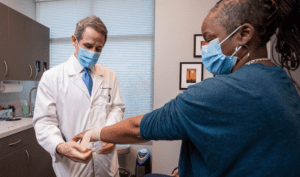Originally published on PsychologyToday.com on March 23, 2023.
Leave your doctor’s office feeling confident.
At least once a day, a patient comes to me and says, “I can’t remember what else I was going to ask you.”
No, it’s not dementia setting in. There can be much to cover with your doctor in a short time. And even if your doctor offers extended visit times, depending on the problem, you might still feel unsatisfied. As physicians, we’re trained to get as much relevant information from our patients as possible, but every interaction is different.
I always review my patient’s chart before a visit to prepare me when I walk into the room. If you come to your appointment prepared as well, that helps us, which ultimately helps you leave the office with a warm, fuzzy feeling, having addressed all your issues thoroughly.
You wouldn’t take a school exam unprepared, so why not prepare for your medical exam? After all, your health is your most important asset. So a little preparation before your appointment can help ensure you leave your doctor’s office feeling satisfied and informed.
The first step is to list all the items you want to address. Many think doctors get annoyed with patients who bring lists, but I love them! A list means the patient is prepared and takes their health seriously. It also means I’m more likely to address all of their questions, which avoids a phone call later in the week. A good mnemonic to follow is P-Q-R-S-T:
- Pain (“Where does it hurt?”)
- Quality (“What does it feel like? Dull? Sharp? Stabbing?”)
- Radiation (“Does it move anywhere?”)
- Scale (“How bad is it? How much does it affect you?”)
- Timing (“When did it start? Does it come and go? What makes it better or worse?”)
Tips to Get the Most From Your Doctor’s Visit
- Be sure to bring a list of all your medications, including as-needed, over-the-counter, and alternative medications, as these can all be important to your care. Even better, pack a bag with all your pill bottles and bring them in, so we can see exactly what you are taking, and discard any expired or discontinued prescriptions.
- Dress appropriately. Think about where your problem is, and make sure we can access that body part easily. If you have knee pain, wearing tight jeans is probably not the best idea. If you have abdominal pain, leave your favorite onesie at home. And if you think you’ll remove any clothing during your visit, please wear clean underwear.
- Try to be on time. I know the old joke about doctors always running late, but often that’s because one patient was late, which sets our entire day’s schedule back. If you are late, there’s a fair chance you might not have a complete appointment.
- Educate yourself on your condition. Patients always tell me, “I know doctors hate Google.” But that’s not true. Doctors hate misinformation. You should be selective about where you get your data because there’s a lot of terrible information on the internet, especially about health.
- Try to be concise. We understand you want to give us a complete picture of your issue, and we genuinely want to hear what you say. However, try to avoid too much information. The fact that your 73-year-old aunt, a professional chef, was visiting from Albany when you had your accident probably isn’t that relevant. Think about how you might explain your problem in just a few sentences. The quicker you can provide pertinent information during your visit, the more time you will be available to discuss your concerns and consider other issues.
- Bring any previous labs or test results so your doctor can review these at the visit. In an ideal world, every test, lab, and consult note would make its way to me, but items often get lost in a digital quagmire. If any relevant tests were done before your appointment, bring the results in so we can have a more complete picture of what’s going on.
- Bring a friend or family member to your appointment. I love it when a spouse comes to the office visit because I know I’m more likely to hear the whole story, and the partner will likely help remember what was discussed.
- Verbally summarize your conversation at the end of your visit, so you and your doctor can be sure you understand everything discussed. I try to give everyone a (legible) handwritten sheet of paper highlighting our visit’s important points. Some patients have told me they kept these for years because they were good reminders for them.
- Finally, bring your ID and insurance card.
Clearly, these aren’t mandatory actions–a good physician should be able to meet most of your needs in any situation. But following a few of these tips will keep you more involved in your care, make life easier for you and your doctor, and likely make you more satisfied with your visit and lead to better health.

